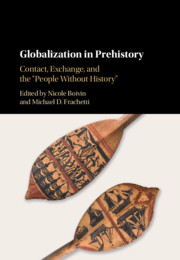Book contents
- Globalization in Prehistory
- Globalization in Prehistory
- Copyright page
- Contents
- Figures
- Tables
- Notes on Contributors
- Preface
- Introduction: Archaeology and the ‘People without History’
- One What’s the Point?: Globalization and the Emergence of Ceramic-using Hunter-gatherers in Northern Eurasia
- Two Globalising Interactions in the Arabian Neolithic and the ‘Ubaid
- Three Domesticate Dispersal, Human Agency and Connectivity in Island Southeast Asia during the Holocene
- Four Bronze Age Participation in a “Global” Ecumene: Mortuary Practice and Ideology across Inner Asia
- Five Prehistoric Globalizing Processes in the Tao River Valley, Gansu, China?
- Six Global Networks and Local Agents in the Iron Age Eurasian Steppe
- Seven Nomads and Caravan Trade in the Syrian Desert
- Eight Invisible Agents of Eastern Trade: Foregrounding Island Southeast Asian Agency in Pre-modern Globalisation
- Nine From Rural Collectables to Global Commodities: Copper from Oman and Obsidian from Ethiopia
- Ten The Tsodilo Hills and the Indian Ocean: Small-scale Wealth and Emergent Power in Eighth to Eleventh-Century Central-Southern Africa
- Eleven Christians and Spices: Hidden Foundations and Misrecognitions in European Colonial Expansion to South Asia
- Twelve Subsistence Middlemen Traders and Pre-colonial Globalization in Melanesia
- Index
- References
Introduction: Archaeology and the ‘People without History’
Published online by Cambridge University Press: 27 September 2018
- Globalization in Prehistory
- Globalization in Prehistory
- Copyright page
- Contents
- Figures
- Tables
- Notes on Contributors
- Preface
- Introduction: Archaeology and the ‘People without History’
- One What’s the Point?: Globalization and the Emergence of Ceramic-using Hunter-gatherers in Northern Eurasia
- Two Globalising Interactions in the Arabian Neolithic and the ‘Ubaid
- Three Domesticate Dispersal, Human Agency and Connectivity in Island Southeast Asia during the Holocene
- Four Bronze Age Participation in a “Global” Ecumene: Mortuary Practice and Ideology across Inner Asia
- Five Prehistoric Globalizing Processes in the Tao River Valley, Gansu, China?
- Six Global Networks and Local Agents in the Iron Age Eurasian Steppe
- Seven Nomads and Caravan Trade in the Syrian Desert
- Eight Invisible Agents of Eastern Trade: Foregrounding Island Southeast Asian Agency in Pre-modern Globalisation
- Nine From Rural Collectables to Global Commodities: Copper from Oman and Obsidian from Ethiopia
- Ten The Tsodilo Hills and the Indian Ocean: Small-scale Wealth and Emergent Power in Eighth to Eleventh-Century Central-Southern Africa
- Eleven Christians and Spices: Hidden Foundations and Misrecognitions in European Colonial Expansion to South Asia
- Twelve Subsistence Middlemen Traders and Pre-colonial Globalization in Melanesia
- Index
- References
- Type
- Chapter
- Information
- Globalization in PrehistoryContact, Exchange, and the 'People Without History', pp. 1 - 14Publisher: Cambridge University PressPrint publication year: 2018
References
- 1
- Cited by



